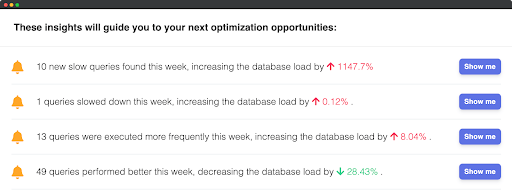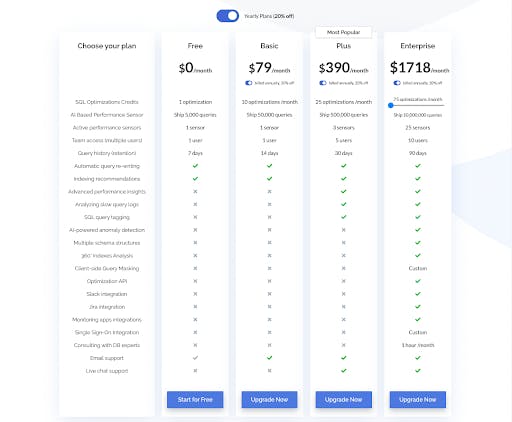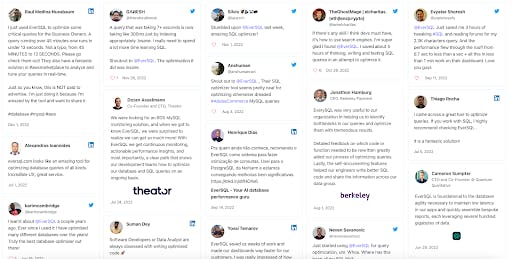EverSQL is an automated AI-powered SQL optimization solution, allowing customers to speed up their MySQL/PostgreSQL databases and applications, to increase satisfaction and improve retention.
Based in Israel, Co-Founders Oded Valin and Tomer Shay launched EverSQL as a bootstrapped business in 2019. Three years on, the business is profitable and the product is used by over 100,000 developers around the world.
We recently caught up with Oded and Tomer to find out what it takes to bootstrap your way to profitability and the lessons they’ve learned along the way.
Bootstrap fundamentals
EverSQL was designed to rebuild the experience of database performance analysis from the ground up, so that developers can do their best work. It’s a mission and product that caught the attention of Venture Capitalists over the years, yet Oded and Tomer chose to stay bootstrapped. Tomer explains:
“As we grew, we did receive offers from VCs but decided to remain bootstrapped, as we felt that customer-generated revenue was the best fuel for our growth.”
Staying bootstrapped meant making core decisions that keep the company laser focused on revenue growth, evaluating costs, and adding value. Tomer added:
“Everything comes down to growing revenue. We have quarterly goals, we constantly review our operational costs, and look at where we can outsource tasks that aren’t core to growing the business.”
Part of staying on track means keeping a close eye on core metrics, including:
- Revenue (including net new revenue)
- Number of customers
- Annual recurring revenue (ARR)
- Monthly recurring revenue (MRR)
- Churn
- Customer lifetime value (CLV)
60 seconds to wow
EverSQL operates with a product-led growth (PLG) motion. The product is sold under four packages that range from free through to enterprise, all of which are accessed through a self-serve checkout process.
This means that the customer needs to quickly understand the value they will get from the product in order to do two things:
1) Decide to sign-up.
2) Choose the right package.
Delivering this clear value proposition is something that Tomer and Oded call 60 seconds to wow. Oded explained how this works in practice:
“We operate under a 60 seconds to wow philosophy - that is, we look at whether or not a prospect can understand what we do and why it’s valuable in less than 60 seconds. This goes for messaging in the product too. Both are crucial for the self-serve model to work – as we rely on prospects signing up and becoming active users without much or even any interaction with our team.”

Aligning value and willingness to pay
Once the value your product delivers is clear, you have to understand how big the problem is for your target customers, and what price can give them a positive return on investment (ROI) for that value. That is, having a clear view of what customers are looking to pay so that product pricing and packaging can be optimized for maximum conversion and revenue generation.
Tomer told us that pricing at EverSQL has been a process and something that has evolved as they understand more about the product value, and their customers. He says:
“We started at a lower price point than we have today. As we have grown, we have updated our pricing in line with our understanding of our customers and how much they value the product. Now, we have packages that grow with our customers - so we can serve businesses of all sizes, and they can scale with us.”

Growing with your existing customer base
For a business to become profitable, it needs more than growth powered by customer acquisition. It needs loyal customers that stay with you over time start – and that start to spend more too.
Oded explained how, by looking at their core metrics, he discovered that they were missing an expansion revenue opportunity with upgrades.
“We knew we had a lot of new customers but when we compared ourselves with other businesses, we didn’t have the same amount of customers upgrading. Customers were just staying with the plan that they started on. So, we invested more time helping our customer understand the value of upgrading to a better plan.”
One of the changes Oded and team made in response was to add in-context (or in-product) messaging to show customers exactly what additional value they would get from an upgrade. Oded continued:
“This helps us showcase how we add real, long term value for our customers – and encourages them to stay customers and grow with us – helping us to grow our business through expansion revenue.”
Building brand advocates
In building a longstanding customer base, you also develop a set of willing brand advocates. As a result, EverSQL has a whole page dedicated to customer testimonials.

EverSQL has slowly built up the number of testimonials they receive (and their reach on social media as a result), simply by asking:
“We send an email asking customers if they have got value from the product. If they answer yes, we ask them to share on Linkedin and Twitter. It’s a simple tactic but it has been really powerful for us - especially as our developer audience is very active, particularly on Twitter.”
Bootstrapping isn’t for everyone
Bootstrapping a business to profitability isn’t easy and both Oded and Tomer recognize that it won’t be the right route for everyone.
“We were lucky to be able to do it. It requires a team with a real can-do mentality. We’re still a lean team - so we automate where possible and everyone has to learn about different areas of the business, even those outside of your core role.”





